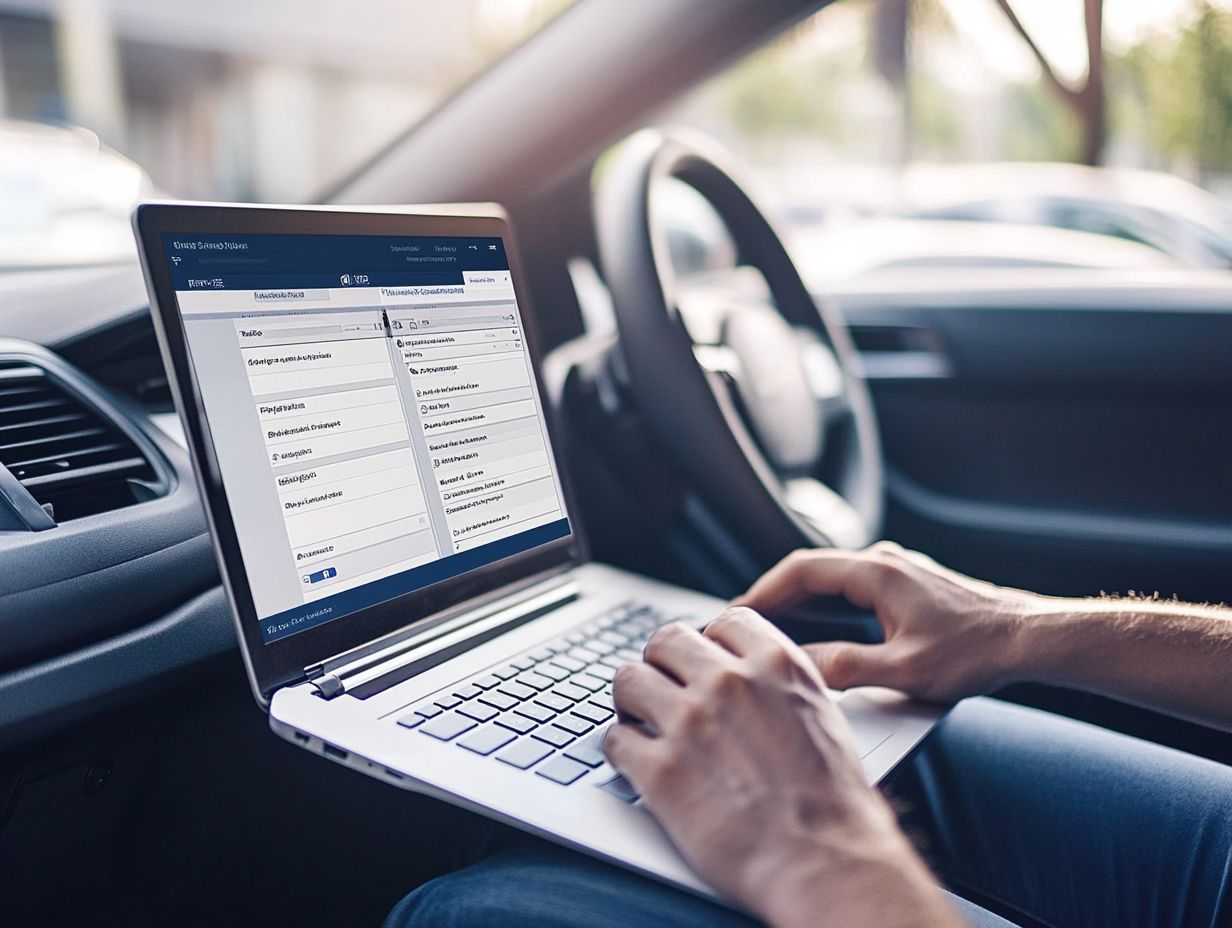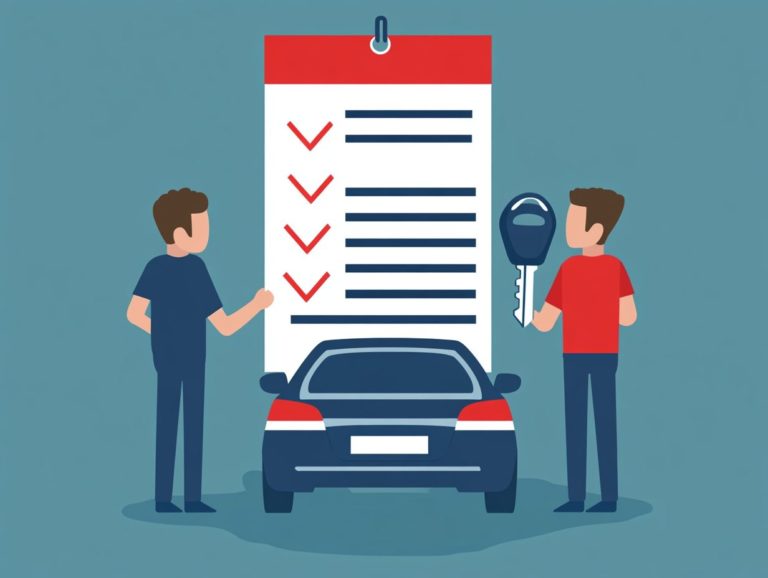What to Know About New Car Insurance
When you’re in the market for a new car, understanding your insurance options is essential. New car insurance not only protects your investment but also helps you comply with legal requirements.
This guide will walk you through the essentials of new car insurance. We will cover the different types of coverage available, key factors to consider when choosing your policy, and practical tips for keeping your premiums manageable.
Whether you re a first-time buyer or simply upgrading your ride, you ll gain the knowledge needed to make informed decisions about your insurance coverage.
Contents
- Key Takeaways:
- Understanding New Car Insurance
- Do I Need New Car Insurance?
- Types of Coverage
- How to Choose the Right Coverage
- Cost of New Car Insurance
- Tips for Lowering Insurance Costs
- Frequently Asked Questions
- What to Know About New Car Insurance?
- Do I Need to Get New Car Insurance When I Buy a New Car?
- What Factors Affect the Cost of New Car Insurance?
- Can I Transfer My Current Insurance Policy to My New Car?
- What Type of Coverage Do I Need for My New Car?
- Is There a Waiting Period for New Car Insurance?
- What Happens if I Get in an Accident with My New Car Before I Get Insurance?
Key Takeaways:

- 1. New car insurance is vital for protecting your investment and meeting state laws.
- 2. Your car’s value, how you use it, and where you live affect the type and amount of coverage you need.
- 3. Knowing the types of coverage, what affects costs, and strategies for lowering premiums can help you choose the right policy and save money.
Understanding New Car Insurance
Understanding new car insurance is crucial for every car owner, especially when buying a new vehicle. To ensure you are well-informed, it’s also important to consider new car safety features. Car insurance acts as your safety net against financial losses from accidents, theft, or other unexpected incidents involving your car.
Since a new car often requires specific coverage options to meet state minimum requirements, knowing the details of different insurance policies is vital. Additionally, understanding how your vehicle identification number (VIN) the unique code assigned to your car affects insurance costs helps you secure better rates.
Don t wait! Compare different insurance options to find the best coverage for you.
Do I Need New Car Insurance?
When you’re purchasing a new car, knowing the necessity of new car insurance is crucial to protect your investment and meet legal obligations. In many states, having at least liability insurance is required for legal driving, and this policy serves as a safety net in case of accidents.
Additionally, it s important to recognize that each state has unique requirements and minimum coverage limits, which can significantly affect your insurance costs. If you re moving from an old vehicle, check if your current policy offers a grace period for coverage on your new car.
Factors to Consider
Several key factors influence whether you need new car insurance, including the specific insurance costs related to your new vehicle and your own preferences for coverage options. As a car owner, evaluate your driving habits, the value of your new car, and the different insurance discounts available that can help reduce your premiums. These factors not only affect the affordability of your insurance but also the level of protection you receive.
For example, if you have a long commute, you might prioritize comprehensive coverage to protect against various risks on the road. Conversely, if you’re just a weekend driver, a more minimal plan might be sufficient. The age and condition of your vehicle also play a significant role; higher-value cars generally come with higher insurance costs due to their replacement value.
However, discounts such as maintaining a safe driving record, bundling your policies, or completing defensive driving courses can significantly reduce those costs. Understanding how these factors interact can lead you to a more tailored and cost-effective insurance solution.
Types of Coverage
Knowing the different types of coverage available is essential when selecting an insurance policy for your new car.
Comprehensive coverage protects against non-collision-related incidents, such as theft or natural disasters, while collision coverage covers damages from accidents, regardless of who is at fault.
Liability insurance is a fundamental requirement in many states, covering damages you may cause to others in an accident. Familiarizing yourself with these options empowers you to choose the right policy that aligns with your needs and budget.
Ready to get started? Secure your new car insurance today and enjoy peace of mind on the road!
Comprehensive vs. Liability Insurance

When comparing comprehensive insurance and liability insurance, each serves a distinct purpose. Comprehensive coverage protects against risks unrelated to driving, such as vandalism.
Comprehensive insurance provides extensive protection, covering incidents like theft, natural disasters, or damage from animals. This makes it particularly valuable for those living in areas prone to such risks.
Liability insurance is often more affordable and only addresses the expenses related to damage and injuries sustained by others when you are at fault in an accident.
For example, if someone hits a tree and their vehicle incurs significant damage, comprehensive insurance would take care of the repair costs. However, if they cause an accident that injures another driver, liability insurance would be the only coverage in play.
Understanding these details empowers you to make the best choice for your unique situation!
How to Choose the Right Coverage
Choosing the right coverage for your new car requires a thoughtful evaluation of various insurance quotes and a clear understanding of your unique coverage options to ensure you have the protection you need.
Consider the value of your new vehicle, your driving habits, and your budget as critical factors in this decision-making process.
By investing time in comparing different insurance companies and their offerings, you can identify the most suitable policy tailored to your specific needs.
Factors to Consider When Selecting Coverage
When selecting coverage for your new car, several factors come into play, including insurance costs, coverage options, and the balance between your monthly payment and the amount you pay when making a claim.
It s crucial to assess your financial situation and determine how much you can comfortably allocate to coverage. Understanding the implications of opting for higher deductibles versus lower premiums can significantly shape your overall insurance experience.
You ll want to explore the various types of coverage available, such as liability, collision, and comprehensive insurance. Each option presents its own set of costs and benefits, which can greatly influence your financial responsibilities if an accident occurs.
While comprehensive coverage might come with higher upfront costs, it offers protection against theft and other non-collision damages, ultimately providing you with peace of mind.
By evaluating these trade-offs, you can make informed choices that not only address your immediate budget but also safeguard you against unexpected long-term financial burdens.
Cost of New Car Insurance
The cost of new car insurance can vary greatly depending on several factors, such as the type of car you own, its value, and the coverage options you choose. Grasping these insurance costs is crucial for your budgeting, especially when you factor in renewal rates that might shift after your initial policy term.
As your new vehicle depreciates, its insurance costs will likely decrease as well. However, understanding what influences these rates is essential for making informed financial decisions.
Factors that Affect Insurance Premiums
Several factors influence your insurance premiums, including your vehicle identification number (VIN), driving history, and the insurance company you select. Each insurance company has its own criteria for determining premiums, which can lead to notable differences between quotes. The make and model of your new car can also affect insurance costs, as some vehicles are considered riskier to insure than others.
Your driving record is key; if you have a clean history, you re likely to enjoy lower rates compared to those with accidents or traffic violations. Insurers also take into account the type of vehicle you drive; sports cars and models with high theft rates tend to come with heftier premiums.
An often-overlooked factor is your credit score. A higher credit score often indicates more responsible behavior.
This translates to lower risks for insurers. To potentially reduce your premiums, consider these strategies:
- Regularly review your credit reports.
- Compare multiple insurance quotes.
- Explore discounts for safe driving or bundling policies.
Understanding these elements gives you the power to make informed choices as you navigate the intricate landscape of insurance.
Tips for Lowering Insurance Costs

You can effectively lower insurance costs for your new car by employing a range of strategies and taking advantage of the discounts that many insurance companies provide.
When you’re in the market for insurance, it s crucial to investigate the available discounts, such as:
- bundling policies
- maintaining a pristine driving record
- participating in safe driving programs
In addition to these common discounts, consider taking proactive measures such as opting for a higher deductible or bundling your auto insurance with home or renters insurance to amplify your savings. Building a cordial relationship with customer service representatives is also crucial; they can offer tailored advice and inform you about niche discounts that aren’t widely advertised.
These strategies help reduce your premiums and make your insurance experience more enjoyable!
Discounts and Strategies for Lowering Premiums
Taking advantage of insurance discounts and employing effective strategies can significantly reduce your premiums while enhancing your overall customer experience with your insurance provider. Many companies offer enticing discounts for safe driving, maintaining good student status, or even bundling multiple policies. These can drastically impact your insurance costs. By implementing these strategies, you can enjoy immediate savings and reap long-term benefits.
Regularly reviewing your coverage and scheduling periodic check-ins can reveal even more opportunities to effectively lower your premiums, underscoring the importance of open communication with your insurer.
Frequently Asked Questions
What to Know About New Car Insurance?
New car insurance is essential for any new car owner. It provides financial protection in case of accidents, theft, or damage to your vehicle. Here are some common questions and answers about new car insurance.
Do I Need to Get New Car Insurance When I Buy a New Car?
Yes, it is necessary to get new car insurance when you buy a new car. Your old insurance policy will not cover your new vehicle, and you need to update your insurance information with your new car’s details.
What Factors Affect the Cost of New Car Insurance?

The cost of new car insurance depends on various factors, such as the make and model of your car, your driving record, your age, and the coverage options you choose. Generally, newer and more expensive cars have higher insurance rates.
Can I Transfer My Current Insurance Policy to My New Car?
Transferring your current insurance policy to your new car may be possible. However, it is best to contact your insurance provider to check if they offer this option. If not, you will need to cancel your old policy and purchase a new one for your new car.
If you have more questions about your new car insurance, don t hesitate to contact your insurance provider today!
What Type of Coverage Do I Need for My New Car?
The coverage you need for your new car depends on your personal needs. Basic liability insurance is required in most states, but you might prefer more comprehensive options.
Comprehensive coverage includes collision and protection against non-collision incidents.
Is There a Waiting Period for New Car Insurance?
Most insurance companies start your new car insurance immediately. As soon as you buy your car, contact your provider to activate your policy.
Having coverage from day one helps you avoid potential risks.
What Happens if I Get in an Accident with My New Car Before I Get Insurance?
If you have an accident before getting insurance, you’re usually responsible for all costs. This includes damage to your car, medical bills, and any liability for injuries to others.
Getting insurance before you drive your new car is essential to avoid financial strain.






